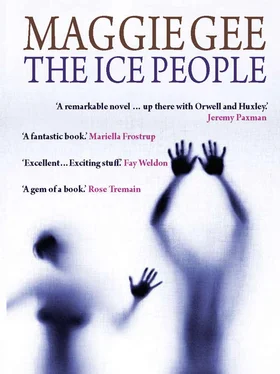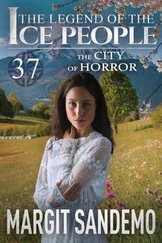Maggie Gee - The Ice People
Здесь есть возможность читать онлайн «Maggie Gee - The Ice People» весь текст электронной книги совершенно бесплатно (целиком полную версию без сокращений). В некоторых случаях можно слушать аудио, скачать через торрент в формате fb2 и присутствует краткое содержание. Год выпуска: 2008, Издательство: Telegram Books, Жанр: Фантастика и фэнтези, на английском языке. Описание произведения, (предисловие) а так же отзывы посетителей доступны на портале библиотеки ЛибКат.
- Название:The Ice People
- Автор:
- Издательство:Telegram Books
- Жанр:
- Год:2008
- ISBN:нет данных
- Рейтинг книги:4 / 5. Голосов: 1
-
Избранное:Добавить в избранное
- Отзывы:
-
Ваша оценка:
- 80
- 1
- 2
- 3
- 4
- 5
The Ice People: краткое содержание, описание и аннотация
Предлагаем к чтению аннотацию, описание, краткое содержание или предисловие (зависит от того, что написал сам автор книги «The Ice People»). Если вы не нашли необходимую информацию о книге — напишите в комментариях, мы постараемся отыскать её.
imagines an ice age enveloping the Northern Hemisphere. It is Africa’s relative warmth that offers a last hope to northerly survivors. As relationships between men and women break down, the novel charts one man’s struggle to save his alienated son and bring him to the south and to salvation.
Maggie Gee
The White Family
The Flood
The Ice People — читать онлайн бесплатно полную книгу (весь текст) целиком
Ниже представлен текст книги, разбитый по страницам. Система сохранения места последней прочитанной страницы, позволяет с удобством читать онлайн бесплатно книгу «The Ice People», без необходимости каждый раз заново искать на чём Вы остановились. Поставьте закладку, и сможете в любой момент перейти на страницу, на которой закончили чтение.
Интервал:
Закладка:
Fleets of them. Quiet now. Heads bowed, wings back.
But if you had seen them in their heyday. Those amazing, brilliantly successful inventions. ‘DOVES — The Wings of a Brave New World.’
And me, white-haired Saul, when I was dark and dashing.
And beautiful Sarah, with her waterfall of hair ….
Time to begin at the beginning.
I, Saul, Teller of Tales, Keeper of Doves, Slayer of Wolves, bring you the story of my glory days.
2
I was born in 2005, in the country on the edge of London, when the Tropical Time was just beginning, what we look back on as the Tropical Time.
Things changed for me early on. All my life I’ve remembered the beginning, though. Green fields, a sandy track, conkers, the low whirrclap of a wood pigeon’s wings. Black and white cattle. A slaughterhouse, a blank brick building where animals moaned. Climbing a hawthorn and spiking my hands. Cow parsley heads like plates of frothed cream, rising to meet me as I fell from above. Thrashing the long wet grass with a stick.
Then fences went up with cartoonlike speed, there were months of dust and hammering, the neat pink houses rose one by one, and when the dust settled, we were in London.
My mother was a loving, worried woman, softly spoken, but a terrier. Almost everything about her was a faded beige, her tired mouth, her pleated cheeks. She read me poetry at bedtimes, watched every move, and denied me sweets, but she was very loving, when she wasn’t tired, and my school shirts were always white. She liked reading, she made me love reading, and yet her jobs were never with books. There were too many jobs; she was often exhausted. She was a care assistant in a Last Farewell Home, where people over a hundred were ‘termed’ unless they had family to take them in. I’m sure she did the job kindly and cleanly. My dad made jokes about her terminating him. Her other main staple was oneoff assignments driving huge haulers for a teleshopping firm, roaring up the emways in the middle of the night. And yet she was a slight woman, not that strong.
My father liked quiet, but he worked for the police, as an enforcer for home prison contracts. His hair was curly, scattered with grey. His face was strong and grave, heavily lined, with big dark eyes, and his voice, heard rarely, was low pitched and slow. It made people listen, that quiet voice. Perhaps it helped him in his job. In those days London had a public policeforce, though the days of public prisons were over. He was also a general law enforcer. If he saw something suspicious, he would go straight in. Most policemen didn’t, according to Samuel. ‘The police have become a bunch of cowards.’
(Dad taught me to be brave. I’ve tried my best. And my son, his grandson, has his brave blood.)
Dad talked less than Mum, and I’m not sure he listened, which must be where I got it from, for Sarah said I never listened … He was a big man. He had high standards. He drank too much. He was slow to anger, but sometimes — Yes, he had terrible rages. I still don’t like to think about them.
But he was a good man. They were good parents. They loved each other, and me, and my sister.
Samuel and Milly. So far in the past. They seem so little now, so innocent, and the time they lived in so safe and tidy. My photos have all gone, of course, but they sit imprinted in my brain, posing for the camera, holding hands and smiling. While I’m alive, they are not forgotten.
All they ever seemed to talk about was the shortage of water and the heat.
I was muddled about it, aged twelve. On the one hand there was never enough water, and watering your garden from the tap was a crime. On the other hand, sea levels were rising, and the white cliffs of Dover had to be shored up after part of them toppled into the sea.
Then the crumbling cliffs and the endless money the government paid to underpin them grew confused in my mind with foreigners. People from even hotter countries were always trying to get in to Britain. The screens showed pictures of the eroded white cliffs, then scenes of dark people, sweating and furious, bullying the immigration officers, shouting and swearing, their black mouths open. Often the army would be called in.
I started to hate these foreigners. There wasn’t enough to share with them. We lived in a threebed brick twentiethcentury cottage with plasterboard doors that never quite shut, and my parents worked harder than anyone.
One day when my mother had come home exhausted from an allnight run to Edinburgh, I told her I hated black people. She came into the garden in her dingy pink nightgown, and begged me to stop slamming my football against the shed. I did three more kicks, then went and lay down on the prickly yellow lawn, ignoring her.
‘What’s the matter?’ she asked. ‘For heaven’s sake.’
‘I don’t like black people,’ I said. ‘The screen said even more of them are trying to get in.’ To me they seemed like liars and scroungers who would keep my family poor for ever. ‘I hate black people. Why must they come here?’
She looked at me with a little frown, a puckered white thread in her sunreddened forehead. ‘Saul — they’re not all the same, you know. You can’t go hating black people.’
‘It’s true, Mum. I saw the pictures.’
‘You don’t understand.’ She sounded peculiar. ‘Saul, listen … look … there’s something …’ She stared at the ground, her mouth working. Then something burst out like a stone at a windscreen. ‘Haven’t you noticed your father’s black?’
‘That’s mad,’ I said. It hurt my chest.
‘Yes. Well — half. Your grandpa was from Ghana. He came here as a student, in the last century.’
‘I haven’t got a grandpa. Shut up. I hate you. Why are you saying these horrible things?’
‘Because it’s true. Grandpa died when you were two.’
I stumbled to my feet. She tried to hug me but I broke away and ran into the house.
In the bathroom mirror I looked for the truth. My skin was golden, as it was before, but I watched it change and become light brown. Spots, I saw, and curly black hair, and features broadening with adolescence. My nostrils, flaring. Yes, and my lips. I saw Dad’s face behind my own.
She said no more. I was stunned, confused.
I tried to talk to my father. It was never easy. He was a shy man, who preferred to be alone. He liked birds; perhaps that’s why he’d gone to live in the country, and until he died he always kept pigeons.
He was throwing them dull yellow kernels of seed, as I tried to talk to him about being black. It was dark in the shed. Everything was dark. There was a dirty little window, high up. But the eyes were bright; so many pairs of eyes, darting about on sheeny silk necks, and Dad and I looking past each other. He didn’t say a lot, but he touched my arm. We stood together in the airless darkness, with the warm bodies quivering and shuffling around us, and I thought, this might be like Africa, though I didn’t have a clue about Africa.
What did he say, exactly? That I should be proud (but how proud was he? He had never told me about myself). That the first humans were African (but ‘You kids are as British as the next person’). That skin colour was not important (and yet it had ‘held me back in the force’). That we were ‘the same as anybody else’ (yet ‘people like us always have to watch our backs’). And the sentences seemed to come out muddled, the pigeons pecked, and it was hard to ask questions.
The thing Mum had told me didn’t make enough difference. At first I expected the sky to explode and the earth to blacken with astonishment. Thirty years later it would change my life, send me off on an odyssey round half the world — But at the time I just became restless, unsettled, no longer sure I was like my neighbours. Not that I looked particularly different. My sister was darker skinned than me, but her lips, like Mum’s, were on the thin side. And yet we shared the same grandfather … In the end I got tired of going over it all.
Читать дальшеИнтервал:
Закладка:
Похожие книги на «The Ice People»
Представляем Вашему вниманию похожие книги на «The Ice People» списком для выбора. Мы отобрали схожую по названию и смыслу литературу в надежде предоставить читателям больше вариантов отыскать новые, интересные, ещё непрочитанные произведения.
Обсуждение, отзывы о книге «The Ice People» и просто собственные мнения читателей. Оставьте ваши комментарии, напишите, что Вы думаете о произведении, его смысле или главных героях. Укажите что конкретно понравилось, а что нет, и почему Вы так считаете.












